

BEHAVIORAL HEALTH
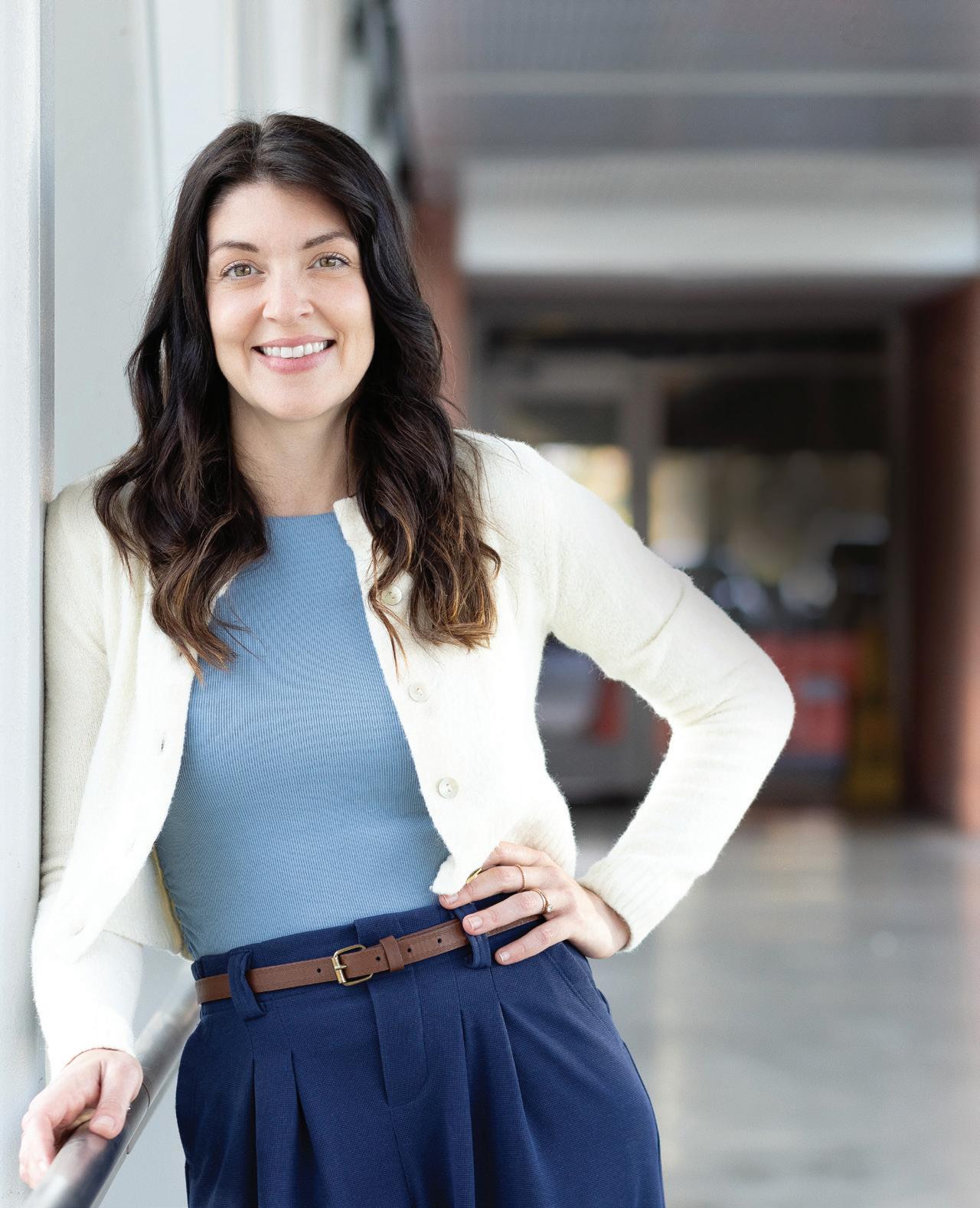
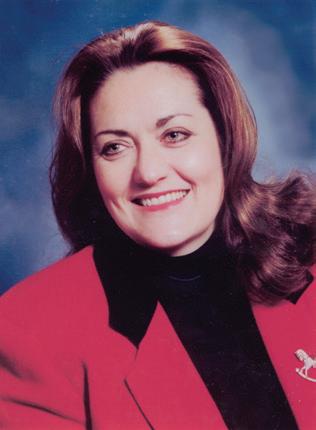
With each article, I hope you’ll share my sense of joy and hope in seeing how small beginnings can lead to transformational outcomes.
From the Dean
On behalf of the School of Behavioral Health, I’m pleased to share with you the latest issue of Behavioral Health. This publication celebrates the accomplishments of our alumni—who are living to make a difference—while also providing up-to-date information about the School and the exciting work our faculty and students are doing through educational and clinical innovation, research, and global service.
In this edition, you’ll find stories of alumni who have reached out in extraordinary ways to serve others, including initiatives designed to support special populations both locally and globally. You’ll also learn about the awards and recognitions some of our alumni, faculty, and students have received since our last issue. In addition, we highlight efforts by faculty to secure funding—through Health Resources and Services Administration (HRSA) and other sources—to support student scholarships and stipends.
Our faculty continue to explore and expand opportunities for collaboration across departments, shared clinical learning, and interdisciplinary research. As part of this work, we’re excited to share more about the SBH Practice, Research, and Clinical Training Innovation Center (PRACTIC). Now fully operational, PRACTIC is designed to support innovation, efficacy, and efficiency in behavioral health practice across Loma Linda University, the surrounding communities, and globally. It serves as a collaborative center bridging clinical training and education with cutting-edge research.
Since our last issue, we’ve also reached several important milestones. The Departments of Psychology and Social Work & Social Ecology each marked 30 years of academic excellence, with close to 1,000 graduates from each program. Additionally, this year marks the 10th anniversary of the pioneering work that our Child Life Specialist faculty began in China to introduce and expand graduate-level training in this field internationally.
With each article, I hope you’ll share my sense of joy and hope in seeing how small beginnings can lead to transformational outcomes.
Finally, as you read this publication, please remember—we’re already planning our next issue, and we want to hear from you! Reach out to us at llualumni.sbh@llu.edu and let us know what you’re doing. We’d love to share your achievements with our current students, and in turn, keep you informed about events in the School and across Loma Linda University. If you email us, please include your phone number so we can follow up with a call.
Thank you for continuing to live out the values of Loma Linda University and your professions by making a difference in the lives of those you serve.
Warm regards,

Dr. Bev Buckles, Dean School of Behavioral Health

SCHOOL OF BEHAVIORAL HEALTH
dean
Beverly J. Buckles
associate dean for academic and student affairs
Winetta A. Oloo
associate dean for finance and administration
Alan Connelly
associate dean for research
Susanne B. Montgomery
director of admissions
Ruth Browder
director of communications and alumni engagement
Diana Krueger
student records
Elizabeth Sundstrom
chair, department of counseling and family sciences
Nichola Ribadu
chair, department of psychology
David A. Vermeersch
chair, department of social work and social ecology
Beverly J. Buckles
CONTACT US
loma linda university school of behavioral health
griggs hall
11065 Campus Street
Loma Linda, CA 92350 909-558-1900
llualumni.sbh@llu.edu
MAGAZINE STAFF
editor
Diana Krueger
contributing writers
Larry Becker
Beverly J. Buckles
Brittany Hitt
Audrey Perez
art direction & design
Ellen Musselman
cover photo by maddison rose october
In This Issue
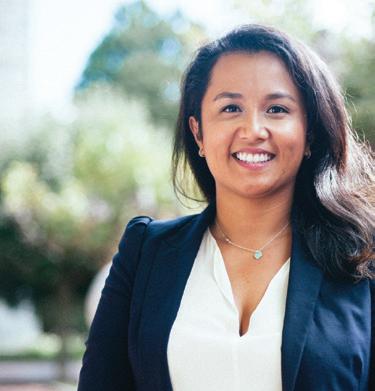
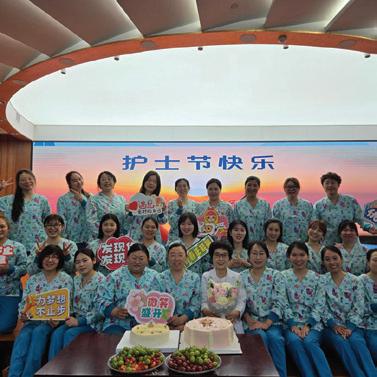
Mission
The mission of the School of Behavioral Health is “to provide a spiritually supportive context for teaching, clinical practice, and research innovation that pursues integrative behavioral health aimed at reducing health disparities and promoting social justice in a global context locally and globally.” The mission of the School of Behavioral Health is underpinned by Loma Linda University’s commitment to the teaching and healing ministry of Jesus Christ to transform lives through whole person care.
02 Letter from the Dean
ALUMNI STORIES
04 How Dr. Andy Tabuenca Built a Career that Honors Her Values
06 Breaking Silos: Dr. Hemmy Asamsama’s Systems Approach to Healing
08 Scaling Mental Health With Trust, Not Clinics
10 2025 Alumna of the Year: Jeany Glasgow RESEARCH
11 The $1.35M Grant Transforming LLU Psychology Training
Expanding the Behavioral Health Workforce: A Grant-Funded Success
12 Dr. Qais Alemi: Refugee Voices, Real Solutions
From Burnout to Balance: Dr. Kelly Baek’s Work with Healthcare Staff
COMMUNITY
13 One Course, Endless Possibilities for These Future Professionals
SBH Practice, Research, and Clinical Training Innovation Center
STUDENT STORY
14 Centering Community, Culture, and Care: Dr. Ryan Chandler’s ALLCOST Program
16 From California to China: A Decade of Healing Together
17 Transforming Psychology for 30 Years
Celebrating 30 Years of Excellence in Social Work Education
ACADEMICS
18 Class of 2025
19 Awards
21 What We Need to Know about Diet Culture
FACULTY UPDATES
22 Selected Faculty Publications
ALUMNI NOTES
23 Updates and In Memoriam

How Dr. Andy Tabuenca Built a Career that Honors Her Values
By Audrey Perez
Dr. Andrea “Andy” Tabuenca earned her PhD in Clinical Psychology from Loma Linda University’s School of Behavioral Health in 2015. Her work reflects a strong focus on pediatric psychology, family-centered care, medical and mental health integration, and advocacy for LGBTQ+ youth—values she carries forward from her training at LLU.
Initially pursuing both psychology and pre-medical studies, Dr. Tabuenca began her education aiming for medical school, influenced by her family’s deep roots in healthcare. After beginning medical school at LLU, she quickly realized her true passion remained with psychology. Trusting her instincts, she made the courageous decision to leave medicine and pursue a Clinical Psychology PhD, a shift that continues to guide her work today.
Dr. Tabuenca credits Loma Linda University with shaping her professional foundation, highlighting the faculty’s genuine commitment to individualized growth and collaboration. “Whenever I had an idea, it was not just accepted, it was supported,” she shared. Through this mentorship, she was able to pursue specialized training in pediatric psychology, medical and mental health integration, and family-centered care, turning her passions into real opportunities.
These experiences helped shape the broader vision she carries today: leading programs, mentoring future clinicians, and creating systems that extend care beyond the individual.
A Career Focused on Community Impact
Following her doctoral training, Dr. Tabuenca completed her internship and postdoctoral fellowship at the Yale Child Study Center, specializing in pediatric psychology and high-acuity psychiatric care for youth. She later joined the faculty at Stanford University, advancing her clinical work across adolescent psychiatry, anxiety clinics, and endocrinology services supporting trans and gender-expansive youth. At Stanford, Dr. Tabuenca emphasized the value of interdisciplinary partnerships, working alongside endocrinologists and medical teams to provide whole-person, affirming care. She focused on integrating mental health services directly into specialty clinics, making it easier for patients to access consistent, culturally responsive support without stigma or delay.
In 2021, she returned to Southern California to join Children’s Hospital Los Angeles (CHLA), where she served within the Division of Neurology. There, she led the development of psychological services for youth with tic disorders, Tourette’s syndrome, OCD, and functional neurological disorders. In addition to her clinical leadership, she worked through the Behavioral Health Institute, providing affirming mental health care for LGBTQ+ youth referred by the Center for Transyouth Health and Development. Her work at CHLA reflected her commitment to integrating mental health into medical settings, expanding access to specialized services, and building programs designed to meet the complex needs of underserved youth and families. Throughout her career, Dr. Tabuenca has remained passionate about creating systems that extend care beyond the individual. “It’s about building something lasting, not just what you can do individually today,” she explained.
Balancing Career and Personal Growth
Alongside her professional milestones, Dr. Tabuenca’s journey reflects a thoughtful commitment to personal balance and growth. After several years in Northern California, she returned to Southern California in 2021, motivated by both family connections and professional opportunities at CHLA.
Following the birth of her second child, she transitioned to a part-time role to focus more fully on her family while continuing her clinical leadership and program development work. Now, as life circumstances have evolved, Dr. Tabuenca feels ready to return to full-time leadership and clinical practice. She is preparing for her next chapter at UCLA, where she will co-direct the EMPWR Clinic, an initiative of UCLA’s Division of Population Behavioral Health that promotes well-being and resilience in LGBTQ+ individuals, and serve as an attending psychologist and clinical supervisor in the STAR Clinic. This transition represents not only a professional step forward but also a return to one of her deepest passions: expanding accessible, affirming care for underserved communities while mentoring future clinicians. In this new role, Dr. Tabuenca will develop training protocols that emphasize tailored, evidence-based care for families and
“It’s about building something lasting, not just what you can do individually today.”
communities undergoing unique and stressful circumstances. She emphasized that this opportunity aligns with her professional vision and reflects her belief in mentorship as a form of equity and legacy-building.
Advice to Doctoral Students and Emerging Professionals
Reflecting on her journey, Dr. Tabuenca emphasizes the importance of aligning professional choices with purpose and sustainability. She encourages early-career clinicians to consider whether a workplace fosters mentorship, creativity, and well-being, not just productivity. “There can be a lot of pressure around how many hours you’re billing, and it can become overwhelming,” she noted. “It helps to find environments where self-care is modeled and supported, not just encouraged in words.” She encourages students to ask themselves, “Do I feel safe to speak up here? Can I bring my whole self into this space?” — a reflection she believes can guide meaningful decisions about where and how to grow as a clinician.
She also highlights the importance of self-care as essential for longevity in the field. Outside of her clinical work, Dr. Tabuenca practices aerial arts, including flying trapeze and aerial hoop, which she credits with helping her maintain balance, creativity, and resilience. “Making time for yourself, and nurturing the parts of you outside of your career, is critical for staying connected to the work you love,” she emphasized.
Above all, she encourages future clinicians to trust their instincts when making career decisions—honoring their evolving passions, staying grounded in their values, and building careers that create lasting, meaningful impact.
Breaking Silos: Dr. Hemmy Asamsama’s Systems Approach to Healing
By Audrey Perez

Dr. Octaviana Hemmy Asamsama earned her undergraduate degree from the University of California, Berkeley, where she double majored in Psychology and Public Health. This early academic combination reflected her longstanding interest in individual care and population-level well-being. She continued her education at California State University, San Bernardino, earning a Master of Science in Clinical Counseling Psychology. During this time, she trained as a marriage and family therapist and began providing clinical services across individual, couples, family, and group settings. These early experiences not only solidified her interest in mental health but also deepened her understanding of how clinical care intersects with systems and communities. She did not view public health and psychotherapy as separate tracks, and instead focused on integrating both into her long-term work. Her foundation across multiple disciplines later became a core strength as she entered more complex healthcare environments.
Her advice is to pursue what feels meaningful and to build careers that are both values-driven and flexible. She reminds us that it’s okay for a path to evolve.
Bringing It Together at Loma Linda University
Dr. Hemmy Asamsama entered Loma Linda University with a clear intention to integrate her clinical and public health backgrounds. She enrolled in the university’s dual doctoral program, pursuing a Doctor of Psychology (PsyD) in Clinical Psychology and a Doctor of Public Health (DrPH) in Preventive Care. She was also an adjunct faculty at La Sierra University, The Art Institute, and California Aeronautical University.
At LLU, she worked closely with faculty mentors, including Dr. Kelly Morton and Dr. Grace Lee. She served as a senior research assistant supporting family medicine residents and completed interdisciplinary rotations in health psychology and medical settings. Her dissertation focused on the relationship between depression and diabetes, which reflected her ongoing interest in interaction between physical and mental health.
Dr. Hemmy Asamsama described the program as supportive and rigorous; LLU offered her an opportunity to integrate and refine the skills she had already been developing across psychology, family systems, and public health. Through research, applied training, and collaboration with medical providers, she developed a stronger awareness of how systems interact to shape health outcomes. Her dual-degree experience helped her think more intentionally about program design, sustainability, and how to advocate for care that meets both individual and community needs.
Her training at LLU reinforced her confidence in designing programs that are not only person-centered, but also guided by preventive, long-term thinking. It was a space that allowed her to grow both clinically and conceptually, and helped her align her values with how she wanted to lead in the future.
Clinical Training and Turning Points
During her internship at the Cincinnati VA Medical Center, Dr. Hemmy Asamsama completed rotations in Primary Care Mental Health Integration (PCMHI) and substance use treatment. Although she had limited experience with substance use work at the time, she described the rotation as “really life-changing.” That experience became a turning point, ultimately leading her to pursue a postdoctoral fellowship at the Washington DC VA focused on HIV and liver disease, followed by a staff role in PCMHI.
She was later recruited back to her original VA site to serve full-time in the substance use program, where she began applying what she had developed across her train-
Photo by Dr. Danessa Mayo
ing, from systems-level thinking to integrated clinical practice. Reflecting on her current work, she shared, “It really does involve both psychology and public health. And I get to use all of the things I learned.”
She has contributed to over a dozen publications and remains active in promoting access to research opportunities within the VA. Although she no longer has protected time to conduct her own research, she continues to advocate for staff and patients to participate in clinical trials and studies that inform the advancement of mental health care.
Leading with Perspective and Purpose
Today, Dr. Hemmy Asamsama manages a substance use disorder program at the VA with a team of over 50 staff. She also serves as the National Coordinator for the HIV and Liver Disease Psychology Postdoctoral Fellowship. Her role bridges direct care, leadership, and system-level planning, with a focus on building care models that are sustainable and rooted in public health.
She has helped implement syringe service programs at two VA Medical Centers, a collaborative initiative involving multiple departments and focused on improving access to harm reduction services. In her leadership, she works to support both patients and staff, emphasizing the importance of workplace wellness and thoughtful program development.
Dr. Hemmy Asamsama approaches her work with a systems lens. She often reflects on what happens after treatment begins and how the lack of structured follow-up can disrupt progress. She refers to this as the “cascade of care” and describes how building clear pathways for continued treatment is just as critical as access itself.
Outside of work, she finds balance through her relationships and family life. Becoming a parent later in life reshaped how she thinks about presence and purpose. She credits her children and husband with grounding her in joy and perspective. “Having children helped me see life differently,” she shared. She also emphasizes the importance of mutual respect at home, in friendships, and in the workplace, noting that sustainability in this field starts with being supported by the systems around you.
She encourages students and early professionals to remain open and curious. Her advice is to pursue what feels meaningful and to build careers that are both values-driven and flexible. She reminds us that it’s okay for a path to evolve. What matters is staying honest about who you are and what kind of impact you hope to make.
Scaling Mental Health With Trust, Not Clinics
By Audrey Perez and Larry Becker
Dr.
Zephon D. Lister,
PhD, MS, MA, LMFT, is a Professor in the Department of Counseling and Family Sciences at Loma Linda University and serves as Director of the Systems, Families, and Couples PhD Program. A two-time LLU alumnus, he earned both his MS and PhD in Marriage and Family Therapy and also holds an MA in Religion from Andrews University. Beyond his administrative responsibilities, his role in the School of Behavioral Health encompasses teaching, clinical training, and research.
Dr. Lister’s academic and clinical interests span a range of interdisciplinary areas, including couples and chronic illness, integrated behavioral health, religion and family functioning, and global mental health. Locally, he coordinates behavioral health services for the Adult Sickle Cell Disease Center at Loma Linda University Health, where he conducts clinical research, supervises clinical trainees, runs psycho-education groups, and sees clients.
Internationally, he is engaged in advancing mental health care through innovative, community-based approaches. His passion for global service, however, has deep roots. At just 16, he participated in his first international mission trip—an experience that sparked a lasting interest in cross-cultural healthcare. This early passion was later reinforced through his MA in Religion, with an emphasis in missiology, where he explored the theological and practical dimensions of global service.
Since returning to Loma Linda in 2017 in his current role, that early calling has been reignited. Dr. Lister has become actively involved in global mental health initiatives, particularly in Africa, where he utilizes task-shifting strategies to scale up mental health services in resource-limited settings. His international work reflects a commitment to sustainable, community-based care, and it continues to shape the broader impact of his professional mission.
Community Behavioral Health in Sierra Leone
In 2016, Loma Linda University Health’s School of Behavioral Health (SBH) trauma team traveled to Sierra Leone in the wake of the Ebola epidemic. Their initial mission focused on teaching the Community Resiliency Model (CRM) to support first responders and community members affected by the crisis.
The impact was immediate. By 2017, several of those community members asked the SBH LLU trauma team to return and train them—teachers, business owners, and other community leaders— to become trainers themselves. Evaluation data collected after this second visit showed that outcomes among these newly minted community trainers matched those achieved by the original clinicians, demonstrating CRM’s potential to scale in low-resource settings.
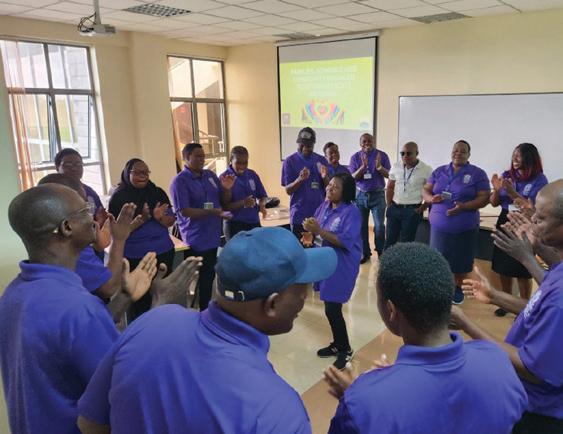
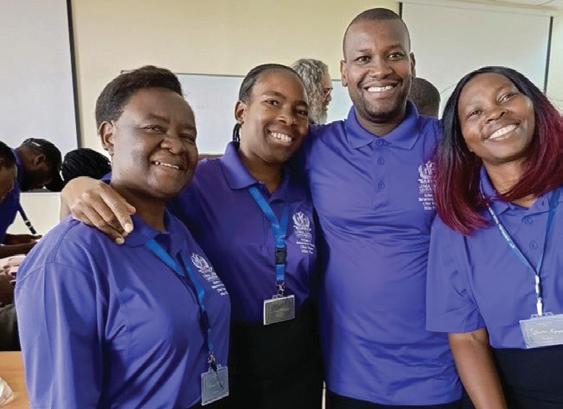
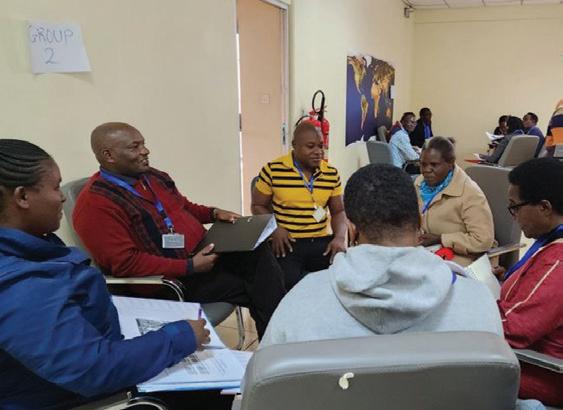





Dr. Lister envisions a global mental health movement
that challenges one-size-fits-all solutions.
Building on that momentum, the community group approached the LLU trauma team again in 2019, this time seeking a sustainable, capacity-building plan to share CRM in the community to address the pervasive mental health challenges that persisted in the community in the aftermath of a decades-long civil war. Dr. Lister joined the project at this stage, helping adapt the program into a task-shifting model that could be owned and led locally. His involvement marked a shift toward long-term partnership: co-developing curricula, mentoring peer trainers, and launching monitoring systems that continue to expand access to mental-health care across Sierra Leone and beyond.
Developing a School-Based Model
When that grassroots network emailed LLU in 2019 asking, “How do we take the next step?” Dr. Zephon Lister—who had joined the trauma team the previous year—partnered with colleagues Dr. Kimberly Freeman and Dr. Susanne Montgomery to design a school-anchored answer: Families, Schools & Communities Engaged Together (FaSCET). Grounded in CRM skills and evidence-based relationship education, FaSCET uses a task-shifting, peer-trainer model so teachers and parents, not outside clinicians, become the mental-health multipliers. FaSCET launched in Waterloo with three primary schools. Twenty-four Grade-5 teachers received 12 hours of FaSCET instruction, then supported the five-week, 10-session curriculum for 240 fifth-graders and their parents—about 500 participants in all—led by a group of CRM-trained community members. Preliminary data from this pilot project demonstrated promising outcomes and was instrumental in securing the LLU GRASP International Grant, which has allowed Dr. Lister and the team to further expand the program into additional countries.
Scaling the Work Through Task Shifting
With seed funding from an LLU GRASP International Grant, Dr. Lister expanded the FaSCET program beyond Sierra Leone, building on the pilot’s success to launch new efforts in Kenya and Rwanda. In 2024, he led a training initiative at the Adventist University of Africa in Kenya, where 16 teachers and a group of non-specialist behavioral health workers were equipped to implement FaSCET in local schools. This phase of the project focused on testing whether peer-led delivery could be scaled effectively while maintaining fidelity to the model, further advancing Dr. Lister’s vision for sustainable, community-based mental health care.
That same year, Dr. Lister collaborated with Dr. Samuel Habimana and RGGO, a long-standing CRM partner, to bring FaSCET to Rwanda. Working with a team of local staff in Nyamagabe District, he supported the adaptation of the model for a new cultural and educational context, continuing to emphasize the cascade-training approach that enables local ownership and long-term impact.
Through these international efforts, Dr. Lister has helped shift global mental health work from short-term interventions to the development of community-anchored, replicable systems of care. By integrating trauma-informed, resilience-based tools
into schools and families—and by empowering local leaders to become mental health facilitators—he is building infrastructure that reaches far beyond the classroom. Evaluations underway in Sierra Leone, Kenya, and Rwanda are laying the groundwork for an NIH-funded multi-country trial that will inform national policy conversations and offer scalable models for psychosocial support in under-resourced settings.
Dr. Lister has also translated his passion for global mental health into the classroom. He developed and teaches the Multicultural and Global Mental Health course within the Systems, Families, and Couples PhD program at Loma Linda University. The course encourages students to examine mental health through a systemic, culturally responsive lens, emphasizing cultural humility, sustainability, and ethical global engagement. Students are challenged to think critically about global mental health frameworks while exploring how systemic thinking can be applied across diverse contexts.
This academic work is deeply connected to Dr. Lister’s international efforts. In partnership with SIMS (Students for International Mission Service), he helped launch a service-learning initiative tied to the course. Through this initiative, students have the opportunity to work directly with local trainers, gaining hands-on experience in collaborative, cross-cultural mental health work. The program not only enriches student learning but also reinforces Dr. Lister’s broader commitment to community-driven, ethically grounded approaches to global mental health.
Together, these efforts—both in the field and in the classroom—reflect Dr. Lister’s vision for preparing the next generation of clinicians and scholars to engage with mental health at the intersection of culture, community, and global responsibility.
Looking Ahead
The work continues to expand, not through external direction, but through local leadership. As community members in Sierra Leone, Kenya, and Rwanda take ownership of FaSCET and other initiatives, the model shifts from a program delivered to communities to one sustained by them. For Dr. Lister, this is the heart of the work: building lasting capacity, trusting local wisdom, and creating space for people to define what healing means in their contexts.
Looking ahead, Dr. Lister envisions a global mental health movement that challenges one-size-fits-all solutions. His focus is not on exporting Western models, but on partnering with communities to strengthen systems already in place, amplifying their voices and equipping them with the tools to lead mental health efforts that are culturally relevant, relationally grounded, and sustainable.
Reflecting on this journey, Dr. Lister shared, “Over time, I’ve realized we’re not bringing solutions—we’re building relationships. The resilience and strength are already there. What’s needed is room for shared collaboration to help it grow.” His work offers a powerful reminder: when mental health care is co-created—centered on trust, dignity, and shared knowledge—it has the potential to reach far beyond crisis response and into lasting transformation.
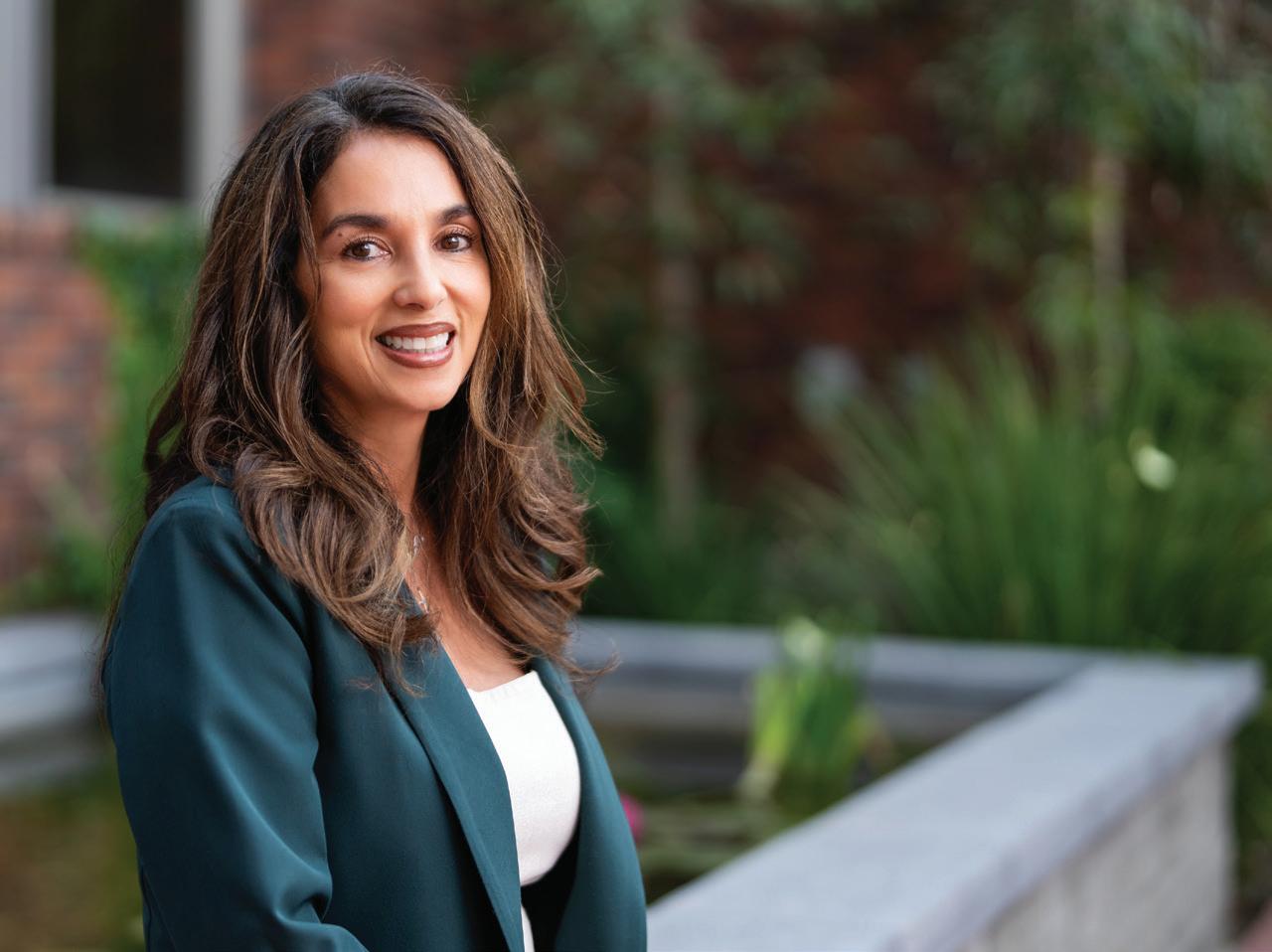
Jeany Glasgow returned to Loma Linda University this year to deliver the Commencement speech for the School of Behavioral Health and the School of Religion. The moment marked a meaningful milestone: 25 years since she completed her Master of Social Work at LLU in 2000. Sitting in the audience were her children, now adults, witnessing what she described as a powerful, full-circle experience. “To come back and speak, with my kids in the audience, kids who grew up watching me work so hard, meant everything,” she shared. “When you graduate, you wonder where you’ll go, whether you’ll make a difference, whether you’ll stay in the field. Being invited back felt like a full-circle moment.”
Ms. Glasgow is a licensed clinical social worker with nearly three decades of public service in San Bernardino County. She currently serves as Director of Children and Family Services, as well as Director of the Children’s Network. In both roles, she supports and leads efforts focused on children, youth, and families across prevention, intervention, and coordinated systems of care.
Throughout her career, Ms. Glasgow has held a variety of roles, including time as a therapist in juvenile hall—an experience she remembers fondly. She shares how movement-based activities helped youth open up, and how those moments reinforced the importance of connection, presence, and trust. While her responsibilities have expanded, those early experiences continue to influence how she approaches leadership and collaboration today.
2025 Alumna of the Year: JEANY GLASGOW
By Audrey Perez
She also reflects on how the work has shifted with time, pointing to challenges such as the influence of social media and the growing complexity of youth mental health. Yet some truths remain constant. “The issues shift year to year,” she said, “but the core of the work stays the same: listening, being present, and showing up.”
Appointed Director of Children and Family Services in 2021, Ms. Glasgow helps guide programs that are designed to be accessible, responsive, and aligned with the needs of local communities. In 2023, she accepted an additional leadership role as Director of the Children’s Network, where she supports cross-agency planning and coordination aimed at improving outcomes for vulnerable children and families, including those in foster care.
A quote from C.H. Spurgeon that continues to guide her is: “A good character is the best tombstone. Those who love you and were helped by you will remember you, so carve your name on hearts, not marble.”
For Ms. Glasgow, this speaks to the heart of service. She emphasizes that, especially in clinical work, the most meaningful impact often happens quietly, without recognition. What matters most is not titles or accolades, but how people feel seen, supported, and genuinely cared for.
The School of Behavioral Health is proud to recognize Jeany Glasgow as the 2025 Alumna of the Year, honoring her leadership, consistency, and continued commitment to children, families, and the community.
Expanding the Behavioral Health Workforce: A Grant-Funded Success
By Dr. Tori Van Dyk
The School of Behavioral Health is concluding a four-year Behavioral Health Workforce Education and Training (BHWET) Program for Professionals grant, funded by the Health Resources and Services Administration. This initiative significantly enhanced training in integrated behavioral health services for children and adolescents.
The first grant objective focused on curriculum development within the doctoral psychology (PhD and PsyD) and MS in Marriage and Family Therapy (MFT) programs. The Department of Psychology introduced a track-based system, allowing students to specialize in one of four emphasis areas: child, health, neuropsychology, or generalist. This structure deepened training in evidence-based child treatment, applied behavioral medicine, trauma-informed care, and health disparities. Similarly, the MFT program enriched its Medical Family Therapy coursework to better prepare students to support children and families facing medical challenges within integrated care teams.
The second objective aimed to expand behavioral health participation in interpro-
fessional education (IPE), which includes collaborative didactic, simulation, and clinical experiences. Building on Loma Linda University’s robust IPE infrastructure, psychology and MFT trainees engaged in interprofessional lab simulations alongside peers from medicine, nursing, pharmacy, allied health, and other disciplines. These sessions emphasized team communication, role clarity, and collaborative problem-solving. Trainees also participated in the Community Action Poverty Simulation, fostering empathy and insight into the challenges faced by patients living in poverty.
The final objective was the creation of a pediatric integrated behavioral health practicum in partnership with SAC Health, a Federally Qualified Health Center (FQHC) serving high-need populations. This practicum placed an average of 14 behavioral health students annually in SAC’s pediatric primary care clinic, where they received stipends for their service. Over the course of the grant, 40 psychology doctoral students and 16 MFT students were supported, with a total of $1.16 million awarded in stipends.
This program not only advanced student training but also significantly improved access to behavioral health care in underserved communities.
The impact has been profound: trainees provided nearly 9,000 free mental health visits to youth and families, including over 2,000 same-day consults initiated during pediatric appointments. This program not only advanced student training but also significantly improved access to behavioral health care in underserved communities.
The Department of Psychology was awarded another four-year BHWET grant which will expand upon the completed program by adding new integrated behavioral health training sites (i.e., LLUCH Pediatric Neurology and Sierra High School), enhancing training in clinical supervision, and awarding an additional $1.3 million in stipends to students.
The $1.35M Grant Transforming LLU Psychology Training
Kelly R. Morton, PhD received $1,349,208 for a 3-year project from the Health Resources and Services Administration’s Graduate Psychology Education grant program. The project is entitled PIPS: Psychology Integration in Primary care for Substance use disorders. The American Psychological Association accredited LLU clinical psychology doctoral programs (PhD and PsyD) will recruit, train and prepare clinical psychology students for community-based primary care settings with a Health Psychology and Integrated Care Specialization to promote culturally competent, trauma informed care with didactics and experiential practicums in underserved settings in our high need areas of San Bernardino and Riverside Counties in southern California. The grant provides $32,500 stipends for 21 students placed in integrated care sites including LLU Family Medicine (SAC Health FQHC Family Medicine and Addiction Recovery Clinic; LLU East campus family medicine in-patient hospital service), Sierra High School Wellness Center, and in the second year of the project at the VA Community-Based Outpatient Clinic in Victorville, CA. These students will also receive up to $1,500 in travel funding to present their accomplishments at professional conferences.
Each practicum site will create systems of care to address mental health as well as SUD/OUDs prevention, assessment, and treatment in high need communities. The PIPS program created the specialization and will enhance elective didactics and improve training at experiential training sites in primary care settings to diversify the integrated behavioral health workforce for underserved communities. PIPS will provide ongoing faculty and supervisor development with HRSA sponsored technical assistance center training, a lecture series, and an SUD treatment workshop. Primary care practicums with stipends will be given to 7 doctoral students a year for 3 years to enhance our psychology primary care pipeline. Though all 115 current psychology doctoral students in residence and 31 on internship can potentially benefit from the project, 21 will be placed in the PIPS clinical practicums. Practicum sites will be enhanced with resource toolkits and quality improvement projects. For our LLU medical center that is a designated Rural Referral Center and a Hispanic Serving Institution, this program will create a pipeline of psychologists to care for patients who are underserved and vulnerable. Our region and the nation have significant mental health provider shortages in an era with a mental health crisis.
Dr. Qais Alemi: Refugee Voices, Real Solutions
Having grown up as a religious minority in a multicultural environment and experienced life as a refugee, Dr. Qais Alemi saw early on how culture, identity and belonging can profoundly shape our mental well-being. Years later, these early experiences became the foundation for his research, which he sees not only as a scholarly pursuit but to advocate for justice and a way to amplify the voices of marginalized communities. Dr. Alemi’s work focuses on the mental health and psychosocial needs of underserved populations—including refugees, immigrants, and racial and religious minorities. These communities face unique challenges, including discrimination, trauma, and barriers to professional care to name a few, according to Dr. Alemi.
His work with refugees has largely focused on understanding the complex factors that contribute to the mental health and adjustment of persons from Afghanistan. Dr. Alemi’s prior research in this area illuminates just how conflict and persecution—and the resulting deprivation of one’s home, land, property, and sense of identity— contribute to poor mental health outcomes among Afghan refugees. He has also found that in this population, accessing professional mental health services is a challenge due to a range of factors such as language barriers, stigma, and mental health literacy. In his most recent study, he worked with an interdisciplinary team to examine the role of patient navigators in facilitating professional mental health treatment through telehealth for newly resettled Afghan refugees across several US states.
What he and his team found was that Afghans enrolled in this patient navigator-led program reported clinically significant reductions in depression and anxiety symptoms at follow-up. Dr. Alemi points to the use of patient navigators from local refugee communities, established refugees themselves and former medical professionals from Afghanistan, as a clear example of how culturally-competent healthcare solutions can break down barriers and help refugees heal.
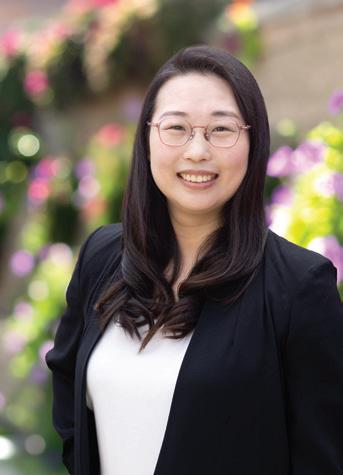
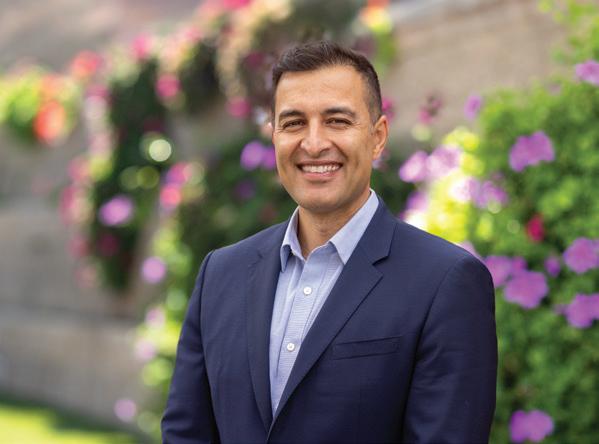
While much of Dr. Alemi’s work has focused on the mental health of refugees, particularly those from Afghanistan, his research also extends to the broader experiences of discrimination faced by racial, ethnic, and religious minorities in the US. Drawing from his own background and community-based collaborations, Dr. Alemi investigates how everyday experiences of marginalization—whether in schools, workplaces, or public spaces—impact well-being and identity development among these groups. His most recent survey focuses on Muslim minorities and their experiences with Islamophobia. In a world that feels increasingly unsafe, polarized, and intolerant, Dr. Alemi believes that identifying solutions to the challenges faced by vulnerable populations is more urgent than ever. He hopes that his research will pave the way for policies that protect vulnerable groups and lead to evidence-informed community-based interventions that can help communities cope with and adapt to ongoing uncertainty. Dr. Alemi remains committed to research that not only advances scholarly understanding, but also drives meaningful, real-world change—especially for those whose voices are too often overlooked.
From Burnout to Balance: Dr. Kelly Baek’s Work with Healthcare Staff
Dr. Kelly Baek’s current research is rooted in supporting those on the frontlines of care. She is studying how the Community Resiliency Model (CRM) impacts mental distress, resilience, and overall well-being among healthcare professionals in the Inland Empire—a region in Southern California that has long faced healthcare shortages and limited behavioral health resources. This project looks at how CRM has helped these professionals manage stress and build resilience before, during, and after the height of the COVID-19 pandemic. The goal is to better understand how practical, body-based tools like CRM can provide sustainable support for emotional regulation and coping in environments where resources are scarce and demands are high.
Alongside this work, she is also engaged in research and program development that focuses on the mental wellness of Asian American communities. Through the Asian American Wellness Interventions Project, she collaborates with community members to offer culturally responsive and sustainable mental health trainings. Her team uses evidence-informed approaches like CRM and Mental Health First Aid, tailoring them to meet the needs of local faith-based organizations and cultural groups. Their focus is on building trust, promoting cultural humility, and creating pathways to wellness that are not only effective but also accessible and community-driven.
One Course, Endless Possibilities for These Future Professionals
This past summer, SBH offered a free undergraduate course to recent high school graduates. The 2-unit in-person course, PSYC 204 Introduction to Behavioral Health, was designed to help students just entering college understand how behavioral health professionals work in healthcare settings, and what careers in behavioral health are like. The course instructors were Dr. Kenny Boyd (Psychology), Dr. Kelly Baek (Social Work and Social Ecology), and Dr. Monique Willis (Counseling and Family Sciences), who introduced their respective profession and its typical roles and activities.
Eleven students took the course, with presentations from each SBH department: Prof. Alisha Saavedra on the Child Life Specialist MS, Dr. Zephon Lister on medical family therapy, Prof. Felisha Cullum on play therapy, Dr. Sophia Truong on the community resiliency model, Prof. Christi Bell on clinical social work, Dr. Tori Van Dyk on sleep disorders, and Dr. Grace Lee
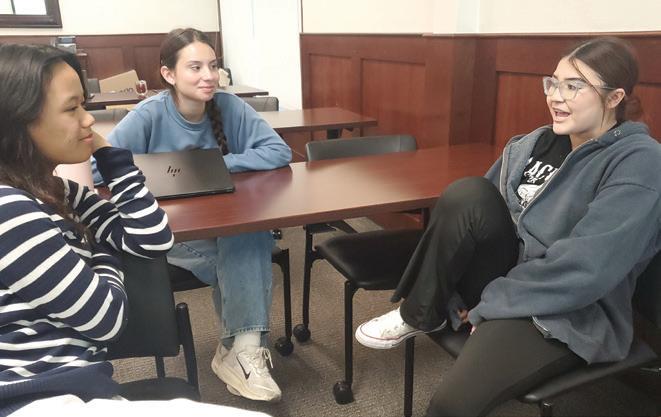
on neuropsychology. In addition, graduate students Ava Swanstrom presented on ADHD and autism treatment, Taline Shishoian on primary care psychology, and Colin Ring on cultural health psychology.
The students appreciated learning about diverse behavioral health career paths. “Intertwined with every profession shown was an appreciation for all humans and a desire to improve their lives. I enjoyed this course immensely and appreciate the tremendous help it has provided in my search for the right career,” said Jason Brayley, a Walla Walla University freshman.
Many of the students entered the course with an interest in healthcare and subsequently became more interested in behavioral health. Kiana Boyle, an Andrews University freshman wrote, “This class has helped me to gain a fuller understanding of behavioral health as a field, and I have a better idea of how mental health professionals can provide meaningful support for their clients.”
Chaffey Community College freshman Joseph Valadez said, “This class has really impacted the way that I understand mental health and its role in the career that I want to pursue.” Neha Shukla, a UCLA freshman, added, “The knowledge and skills I’ve gained throughout the duration of this course have most definitely shaped my future career path.”
Students can have the 2 quarter units transferred to their undergraduate institution as a general elective. The next course will be offered June 22-25, 2026, on the Loma Linda University campus.
SBH Practice, Research, and Clinical Training Innovation Center
For some time, the faculty within the School of Behavioral Health have been actively working to expand intraschool collaboration, research, and shared clinical learning opportunities. In 2022, these efforts led to the creation of the SBH Practice, Research, and Clinical Training Innovation Center (PRACTIC). Now fully operational, PRACTIC aims to enhance innovation, efficacy, and efficiency in behavioral health practice at LLU, in surrounding communities, and globally. The Center achieves this by fostering interdisciplinary collaboration that bridges clinical training and education with cutting-edge research.
PRACTIC represents all SBH professions, including those in the Departments
of Counseling and Family Sciences, Psychology, Social Work and Social Ecology, and the Division of Interdisciplinary Studies. Located at the LLU Mountain View Plaza, PRACTIC includes two primary divisions:
• Clinical Services and Education Division – home to the SBH Resiliency Clinic and specialized training programs for students.
• Research and Community Training Division – includes Research Administration (which oversees grants and other projects), the Community Training Program, and the Translational Research Across Childhood (TRAC) programs.
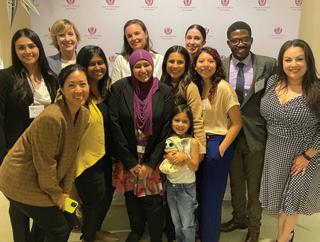
Each division continues to thrive, offering growing opportunities for faculty and student research, clinical training, and community outreach.

Centering Community, Culture, and Care: Dr. Ryan Chandler’s ALLCOST Program
By Audrey Perez

Photo by Zheng Ren
Dr. Ryan Chandler completed the Doctor of Marital and Family Therapy (DMFT) program at Loma Linda University in June. Before entering the doctoral program, Dr. Chandler completed his master’s degree in Marriage and Family Therapy from National University, formerly known as Northcentral University. His graduate studies took place across four different institutions over the course of five years. Balancing academics with travel and work in the music industry made the journey nontraditional, but it also helped shape his focus and determination.
Dr. Chandler shares that his experience at Loma Linda University has been one of the most supportive and welcoming learning environments he has encountered. Faculty members, staff, and classmates have been intentional, kind, and encouraging throughout his time in the program. Despite the online format, he describes the connection he has built with his cohort as genuine and meaningful. These relationships have served as an important source of support, especially while balancing fatherhood, supervision responsibilities, and clinical work.
Dr. Chandler’s clinical interests center on working with couples and adolescents. His approach is rooted in cultural awareness, systemic care, and a relational foundation that honors lived experience. His doctoral project, titled “The ALLCOST Program,” reflects his vision of bringing mental health care into overlooked and underserved spaces, particularly within the hip-hop music industry.
The ALLCOST Program is a mental health initiative designed to provide structured support for Black hip-hop artists who are signed to record labels. Dr. Chandler explains that many artists are given large financial advances without access to mental health care, insurance, or long-term support systems. His doctoral project proposes that at the time of signing, artists receive assessments for concerns such as PTSD, grief, depression, anger, and substance use. From there, they would be connected with therapeutic services, skills-based resources, and psychoeducation focused on emotional regulation and coping strategies.
Dr. Chandler developed this program in response to the alarming rise in mental health and substance use-related deaths within the music industry. He observed that although artists generate significant revenue, they are often left to navigate the emotional and systemic toll of the industry on their own. The ALLCOST Program aims to shift that reality by offering sustainable, preventative care that centers both well-being and career longevity.
His connection to this work comes from both personal and professional experience. He grew up on the South Side of Chicago, where hip-hop was more than music. It was a cultural language, a form of identity, and a source of community. After earning his undergraduate degree in sociology from Tennessee State University, Dr. Chandler became a music journalist, writing for one of the most well-known hip-hop publications in Chicago. He conducted interviews, reviewed albums, and spent time in studios where he witnessed firsthand the impact of trauma, addiction, and violence on artists.
These experiences stayed with him and shaped his decision to pursue a career in mental health. Dr. Chandler views therapy and music as
The ALLCOST Program is a mental health initiative designed to provide structured support for Black hip-hop artists who are signed to record labels.
deeply connected. Both involve storytelling, emotional processing, and relationship-building. He now uses that background to inform his clinical lens, drawing on the power of culture and connection to help others heal.
Throughout his time in the program, Dr. Chandler has also served as a supervisor for master’s-level students. When asked what advice he would offer, his response is clear and honest: “Do it at your own pace.” He emphasizes that school does not exist in isolation. Life continues throughout the academic journey. It is important to remain committed, but also to allow space for rest and reflection.
He encourages students to make time for themselves and their relationships. He shares that he intentionally created boundaries to maintain his balance. For example, he dedicated Mondays as a no-school day to reset and be fully present with his family. He reminds others that maintaining mental and emotional wellness is not only necessary, but also aligns with what we teach our clients.
“Start by being human in the room,” he adds. “Therapeutic interventions will come with time and practice, but your presence and authenticity matter most.”
Dr. Chandler’s story reflects a deep commitment to equity, cultural responsiveness, and systemic change. As he prepares to graduate, he continues to focus on bridging the gap between mental health care and the communities that need it most. His work is a reminder that healing is relational, and that meaningful change often begins by showing up and holding space for others, especially in the places where support has historically been absent.
From California to China: A Decade of Healing Together
In the Fall of 2017, the Loma Linda University School of Behavioral Health (SBH) inaugurated a pioneering academic initiative aimed at equipping pediatric nurses from the People’s Republic of China with formal training in the field of Child Life. This program was the culmination of a four-year academic exchange between SBH faculty and students and Zhejiang University Children’s Hospital (ZUCH) in Hangzhou, China. This collaboration introduced key child life theories and concepts to Chinese pediatric professionals, promoting cross-cultural exchange and enhancing global pediatric psychosocial care.
The collaborative partnership between the SBH and Zhejiang University Children’s Hospital was initiated in 2014, when program director Michelle Minyard-Widmann and clinical director Alisha Saavedra conducted an initial visit to ZUCH to introduce the foundational principles of family-centered care and emotional safety initiatives. This initial engagement laid the groundwork for a subsequent visit later that year, during which SBH faculty and students delivered a series of lectures and experiential workshops—including Teddy Bear Clinics—designed to demonstrate therapeutic play techniques that facilitate pediatric coping with hospitalization and medical interventions. Between 2014 and 2020, annual visits by SBH Child life faculty and students played a critical role in embedding child life principles into the institutional culture at ZUCH, thereby fostering sustained cross-cultural knowledge exchange and capacity building in pediatric psychosocial care.
Per the lead Child Life practitioner Xiaohua (Nancy) WU, RN, CCLS at ZUCH, “A foundational grant was awarded to ZUCH supporting the development of its own child life program—an especially notable advancement at a time when China had only one practicing Certified Child Life Specialist (CCLS).” Subsequent strategic conversations involving ZUCH leadership, the Loma Linda University Global Health Institute, SBH administration, and the child life manager at Loma Linda University Children’s Hospital (LLUCH) led to the creation of a formal training track aimed at expanding child life services in China.
Today, ZUCH’s child life initiative spans three hospital campuses and includes 58 child-friendly play environments, such as therapeutic playrooms and child-centered libraries. The hospital’s Child Life team consists of 60 trained pediatric nurses. Each clinical department has ten educational and therapeutic play kits to help prepare children for medical procedures which include items to educate children about admission to the hospital, emotional support resources, diagnostic education tools, and psychological preparation materials for exams, procedures, and surgeries. These kits reflect a comprehensive approach to pediatric patient care.
One of the hallmark achievements of the ZUCH program is the development of the award-winning Medical Squadron tabletop card game, which received the “Best Social Impact Award” at the 3rd Asian Gamification Conference (GCA). Additionally, ZUCH has published its own Child Life Standards (2023) and the book Child Life Practice (2024), both of which now serve as foundational texts for child life programs across China.
In April 2024, ZUCH further advanced its national leadership in the field by launching the first Zhejiang Health Commission-certified “Child Life Specialist Nurse” training program. The program’s inaugural cohort trained 30 nurses from 10 provinces, while the second cohort, beginning in April 2025, includes 27 nurses from 12 provinces. The cohorts reflect a growing nationwide interest in child life services and training.
On October 8, 2024, ZUCH hosted the Child Life 10th Anniversary Celebration, marking a decade of progress. The event featured the release of the Chinese edition of Healing Children, as well as the official establishment of the National Child Life Innovation Alliance—a collaborative network comprising 17 leading pediatric and general hospitals across China.
Despite growing enthusiasm, challenges remain. There is significant interest among Chinese healthcare professionals in obtaining the international Child Life Specialist certification through the Child Life Certification Commission, However, obstacles such as language barriers, limited access to clinical training opportunities, and the excessive costs of overseas study continue to impede progress.
Given Loma Linda University’s long-standing partnership with ZUCH, there is strong interest in exploring future collaborations to help address these barriers. Specifically, stakeholders have expressed a desire to develop a joint training initiative—potentially including
virtual instruction and domestic clinical placements—to support eligible Chinese nurses in pursuing CCLS certification. Establishing LLU as a recognized clinical site for international CCLS candidates could open important doors for professionals facing logistical and linguistic challenges. This evolving partnership reflects Loma Linda University’s ongoing commitment to global health and education, and offers a promising vision for expanding high-quality, compassionate pediatric care worldwide through child life services.
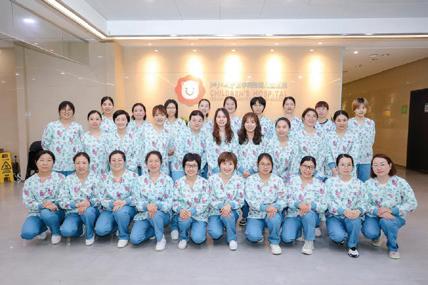
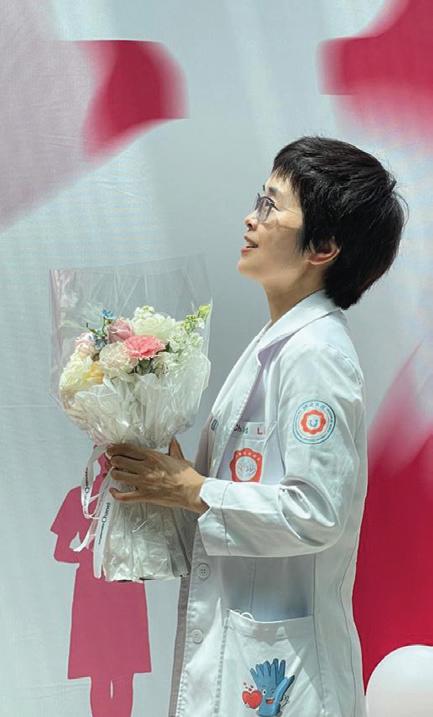


Transforming Psychology for 30 Years
By Dr. David Vermeersch, Chair, Department of Psychology
This past year brought with it the 30th anniversary of our incoming class. Three decades of growth, achievement, and transformation have shaped us into the vibrant and dynamic department we are today. We celebrated the many accomplishments, and look forward to an even brighter future as we continue to advance the field of psychology through our teaching, research, and service.
Since our inaugural classes of 1994, our department has been firmly rooted in the idea that sound psychological practice rests on a firm psychological science foundation. From our humble beginnings, we have flourished into a nationally recognized department committed to academic rigor, innovative research, cutting-edge clinical practice, and the holistic development of students and those we serve.
In these 30 years, we have seen the department grow in both size and influence. We have evolved from a department with one faculty member (Dr. Hector Betancourt, our founding Chair) to one that now has two APA-accredited programs (both of which have been accredited for over 25 years), 15 faculty, over 140
students, and hundreds of alumni who have completed internships, postdoctoral fellowships, and been employed in all 50 states. Our faculty have mentored students as clinicians and researchers, published influential research, secured prestigious grants, and used their work to positively influence patients, our campus, and our broader community. The contributions of our faculty, students, and alumni have been central to shaping who we are today. We hope that Dr. Alvin Straatmeyer (our inaugural Director of Clinical Training/ Program Director) captured the sentiment of all those who are part of our department family when he said, “My years at LLU were the happiest and most gratifying of any in my whole career.”
As we conclude our celebration of this amazing milestone in the history of our department, we extend our heartfelt gratitude to all those who have been part of this journey—our dedicated faculty, staff, students, alumni, and community partners. Together, we have built a legacy of excellence that will continue to inspire and shape the future of psychology for many years to come!
Celebrating 30 Years of Excellence in Social Work Education
By Dr. Bev Buckles, Dean, School of Behavioral Health
This year marks a significant milestone—the 30th anniversary of our Master of Social Work (MSW) Program. For three decades, this program has stood as a pillar of excellence in social work education, distinguished by its commitment to behavioral health and the advanced clinical preparation of its graduates.
From its inception, our MSW Program has been guided by a clear mission: to prepare competent, compassionate, and ethical social work professionals who are equipped to address the complex behavioral health needs of individuals, families, and communities. Our curriculum has continually evolved to remain responsive to the changing landscape of mental health and social services, integrating evidence-based practices, resiliency and trauma-informed care, and cultural humility into every aspect of student learning and clinical training.
Over the past 30 years, our graduates have gone on to become skilled clinicians, innovative leaders, dedicated educators, and tireless advocates. They are making a difference in hospitals, community mental health agencies, schools, integrated health systems, and organizations—locally, nationally, and even around the globe. Their impact is a living testament to the values of the profession, this University, and vision and dedication of the faculty who have shaped our program.
As we celebrate this anniversary, I want to honor the faculty who have inspired and mentored the generations of our graduates; the community partners who have provided invaluable training opportunities; and, most of all, the students and alumni whose commitment to service continues to bring hope and healing to those in need.
Looking ahead, we remain steadfast in our commitment to advancing clinical social work education and practice at Loma Linda University. With gratitude for the past and confidence in the future, we celebrate 30 years of transformative education and meaningful impact in clinical social work education and practice.
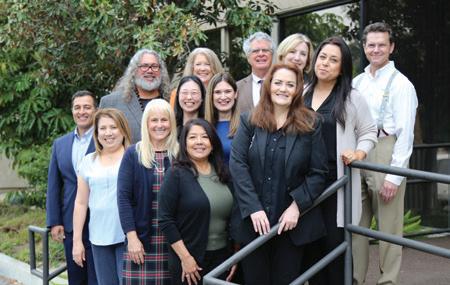
Congratulations, Class of 2025!
By Dr. Winetta Oloo
We are thrilled to celebrate the nearly 150 incredible graduates who have crossed the finish line, completing their journeys through one of our six distinguished doctoral programs and five dynamic master’s programs! This outstanding cohort represents the best of who we are: dedicated, resilient, and deeply committed to serving others. They’ve not only embraced the mission and values of our university but have lived them out through groundbreaking research, transformative clinical work, and heartfelt community engagement. Their impact is already being felt in the field of behavioral health, and we know this is just the beginning. As they step into the next chapter of their professional lives, we celebrate all they’ve accomplished and eagerly anticipate the difference they will make in the world.
We couldn’t be prouder to welcome the Class of 2025 into our alumni family!
Photography by Alex Tapia
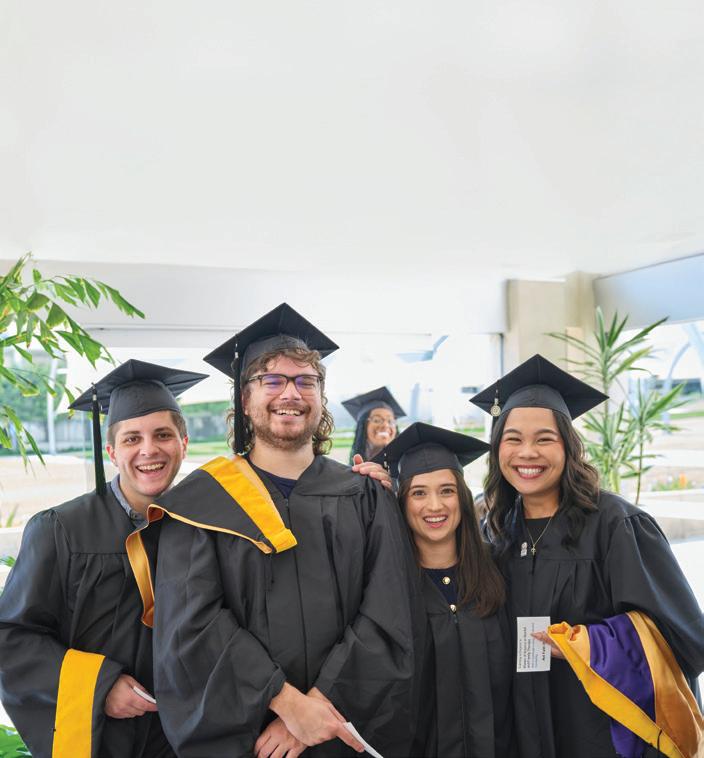

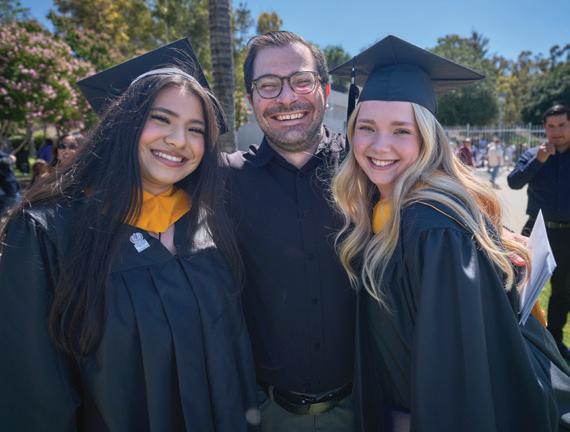
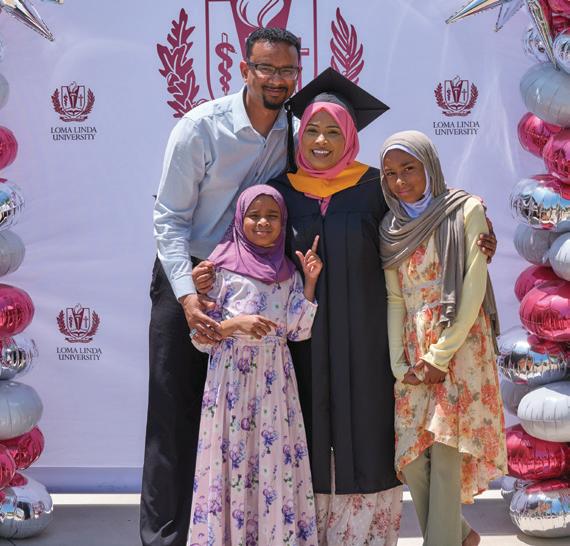
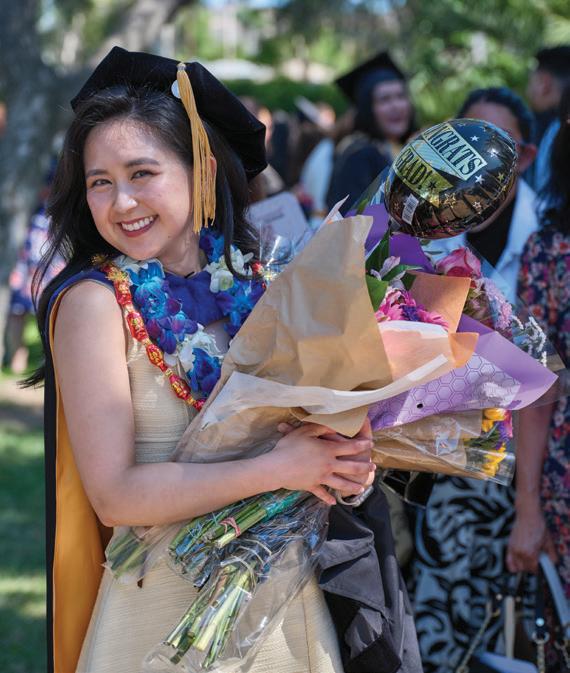
2025 Student Awardees
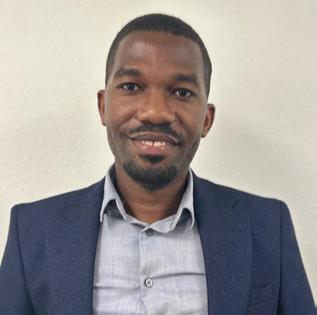
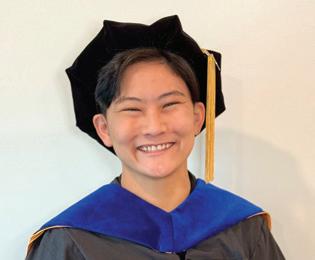
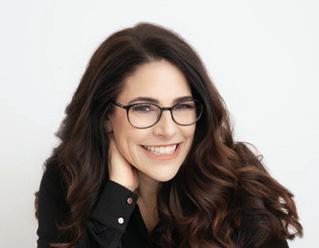
President’s Award: Dr. Samuel Habimana
“I am deeply honored to receive the President’s Award and the Research Excellence Award from the School of Behavioral Health at Loma Linda University. I am sincerely grateful to the leadership, faculty, and the Loma Linda University Church community for their invaluable support. Special thanks to Deans Dr. Beverly Buckles and Dr. Susanne Montgomery for believing in me. I also thank my family—my parents, wife, and my children and mentors and friends for their unwavering support. This recognition strengthens my commitment to advancing impactful research, promoting community resilience, and contributing meaningfully to the field of behavioral health.”
Dean’s Award for Doctoral Degree Programs: Dr. Brooke Iwamoto
“I am honored and deeply grateful to have been selected to receive the 2025 SBH Dean’s Award for Doctoral Degree Programs and Research Excellence Award. I truly appreciate all the support that I have received from LLU and feel incredibly fortunate to have had the opportunity to train with exceptional mentors, faculty, and peers.”
Dean’s Award for Master’s Degree Programs: Elyse Cyphers
“Receiving the Dean’s Award is a deeply humbling honor and a reflection of my gratitude to Loma Linda University, our faculty, and my fellow graduates for the opportunity to be part of a clinical program rooted in compassion, excellence, and wholeness— values I will carry forward with a heart committed to serving children and families with compassion and hope.”
Wil Alexander Whole Person Care Award:
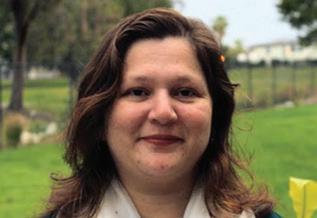
Dr. Kanwal Hassan
“I accept this award with immense gratitude and feel blessed to have been given the opportunity by Allah SWT to study under the guidance of such outstanding teachers/ leaders who taught me to build my skillset as a DMFT, encouraging me to incorporate a systemic lens to address mental health disparities at family and community level.”
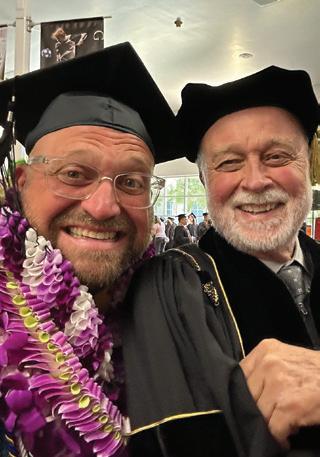
K.C. Hohensee
“It was an incredible honor to receive the Wil Alexander Whole Person Care Award for the 2025 graduation season. Having been a personal friend of Dr. Alexander, and someone I valued deeply as an inspiration and mentor, being tied to his legacy in this way is tremendously meaningful. As I reflect on Dr. Alexander’s noted commentary that ‘the patient becomes the best teacher,’ I hope in my future practice to continue his legacy of helping my future clients to provide space for them to tell their story. I, like Dr. Alexander, wholly believe that we all find ourselves ‘feeling better after having told [our] story.’ And that it is integral to the healing process of whole person care.”
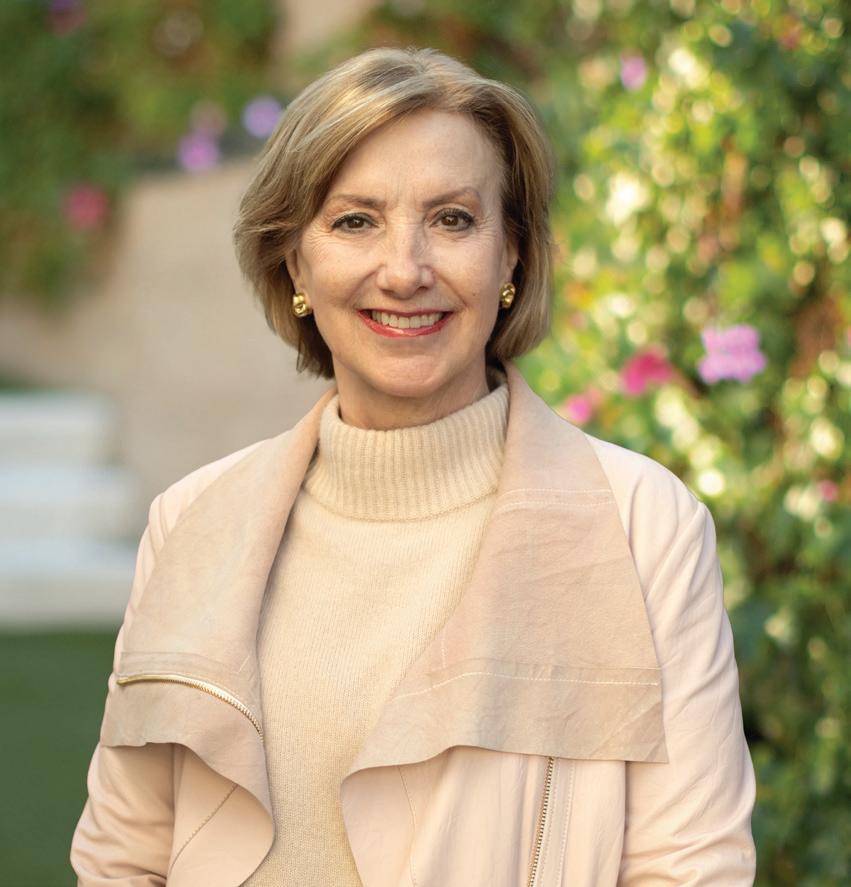
SBH Distinguished Service Award: Dr. Susanne Montgomery
In recognition of Dr. Susanne Montgomery’s exceptional contributions to research innovation, collaboration, and capacity building, the School of Behavioral Health is honored to recognize her with our Distinguished Service Award.
Dr. Montgomery joined Loma Linda University in 1995 and has distinguished herself as a scholar, researcher, and teacher. Dr. Montgomery has served as a Principal and Co-Investigator on numerous projects for the National Institutes of Health (NIH), Centers for Disease Control and Prevention (CDC), and for state-funded initiatives. She has published over 140 peer-reviewed articles and serves as a peer reviewer for NIH, CDC, and various professional journals.
Under her guidance, the SBH has become one of the leaders within Loma Linda University Health in research and extramural funding. She plays a pivotal role in advancing behavioral health research across the university, working closely with faculty, clinicians and students both within SBH, other LLU schools, and practice settings to advance translational research and secure external funding. These efforts have also substantially supported the School of Behavioral Health to secure funding for student scholarships and stipends for its doctoral and master’s students.
Trained as a social/behavioral epidemiologist, Dr. Montgomery’s research focuses on underserved, hard-to-reach populations, addressing health disparities through improved behavioral health prevention services and patient outcomes. Her commitment to collaborative research continues to be demonstrated through partnerships with local communities, utilizing mixed methods approaches to conduct participatory research. She continues to build international collaborations in India and with several Loma Linda University African partner institutions, and other global entities—all of which contribute to the university’s mission of furthering the teaching and healing ministry of Jesus Christ.
RESEARCH EXCELLENCE AWARD
GRADUATES
• Cintia Alfonso Fior, PhD
• Samuel Habimana, PhD
• Brooke Iwamoto, PsyD
• Jacylyn Jones, DMFT
• Christine Lopez, DSW
• Diana Marin, PhD
• Kelly Shearer, PhD
FACULTY EXCELLENCE AWARDS—
SCHOLAR CLINICIAN
• Danielle Clair, DMFT
SCHOLAR EDUCATOR
• Kenny Boyd, PhD, MA
• Michelle MinyardWidmann, MS
SCHOLAR RESEARCHER
• Qais Alemi, PhD, MPH, MBA
• Alex Dubov, PhD, MDiv
• Zephon Lister, PhD, MS, MA
• Kelly Morton, PhD, MA
• Lynn Raine, PhD, MSW
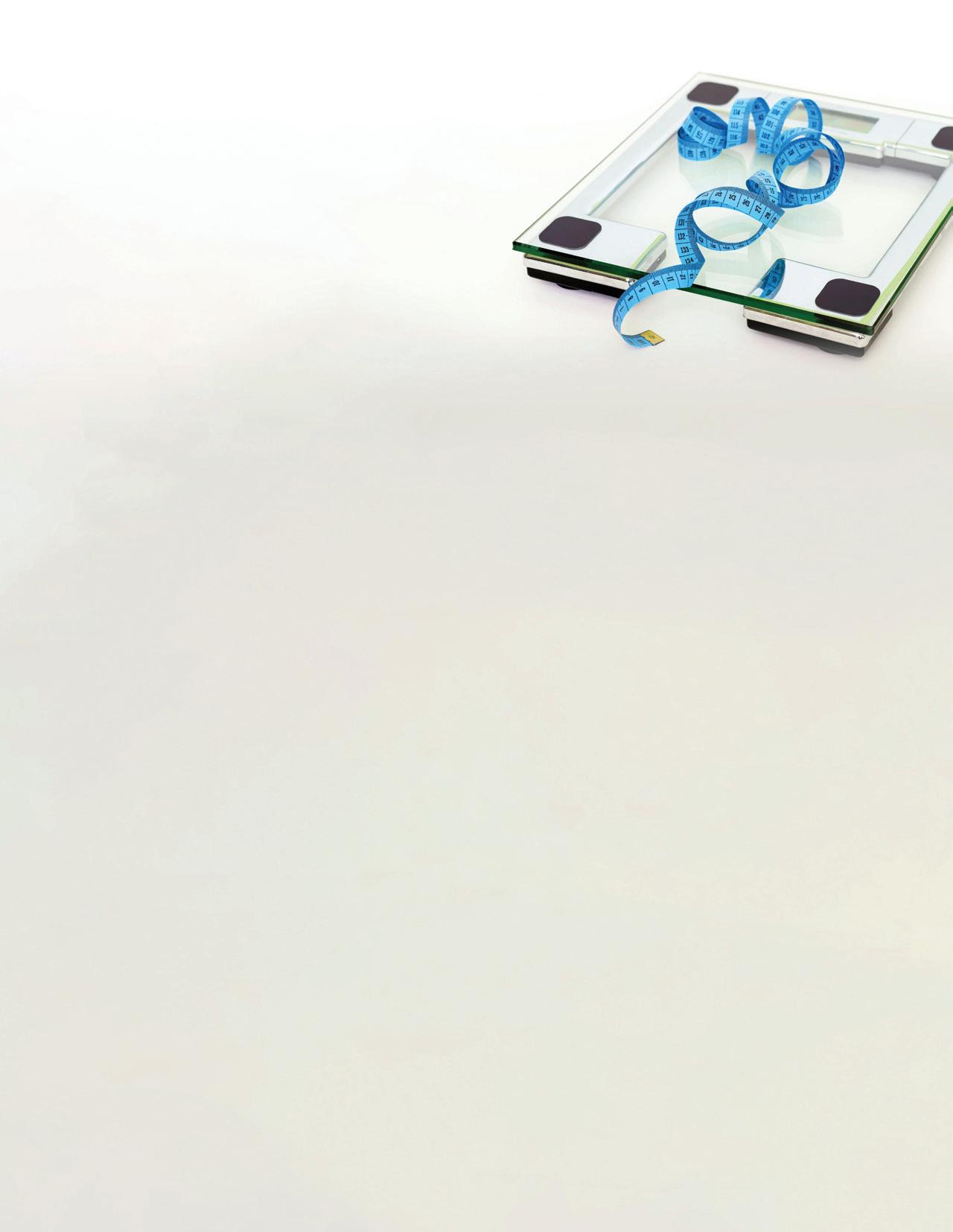
What We Need to Know about Diet Culture
By Brittany Hitt, MSW, LCSW
Dieting, exercising, and other weight loss practices are currently hot topics in today’s news and culture, appearing in commercials, on social media, and even in everyday conversations. According to the National Alliance for Eating Disorders, in their article, “What Are Eating Disorders?” (July 11, 2024), “People of all ages, genders, socioeconomic statuses, shapes and sizes, sexual orientations, abilities, neurodiversities, races, and ethnicities can experience an eating disorder.” Additionally, here are some other statistics and facts regarding eating disorders that I would like to bring to your attention from the National Eating Disorder Association in their article Eating Disorder Statistics (April 16, 2025):
• “Fear of weight gain, feeling like one is overeating, feelings of guilt, thinking about dieting, and a desire for thinness are predictive of eating disorder severity.”
• “Less than 6% of people with an eating disorder are medically underweight.”
• “Every 52 minutes 1 person dies as a direct consequence of an eating disorder.”
Given the severe medical complications associated with eating disorders, clinicians specialize in this area and are trained to work with individuals diagnosed with such disorders. However, it is essential to note that there may be a chance that you are working with clients with undiagnosed eating disorders, or these issues might be present even among the people you know, given the statistics. Therefore, it is beneficial for us to be aware of what to observe during our interactions with others, as well as educate ourselves to avoid any potential biases or assumptions. Now, it is imperative to note there are eating disorders that do not have a negative body image component, such as Avoidant Restrictive Food Intake Disorder (ARFID). However, there are eating disorder diagnoses that are impacted by negative body image, which can lead to maladaptive behaviors intended to lose weight that can ultimately result
in an eating disorder, such as Anorexia Nervosa, Bulimia Nervosa, or with most presentations under the diagnosis of Other Specified Feeding and Eating Disorder (OSFED).
Diet Culture is a noteworthy factor to keep in mind when considering the prevalence of eating disorders. The National Alliance of Eating Disorders defines Diet Culture in their article on June 27, 2023, The Surprising History of Diet Culture, as the “pervasive belief that certain body types are better than others.” These beliefs stem from myths about what should be classified as “healthy” or “good.” Furthermore, Diet Culture promotes the thin ideal, celebrating certain body types while shaming others (National Alliance of Eating Disorders, June 27, 2023). You see this on social media, where influencers share what they eat in a day or when a co-worker says, “I was bad today; I had that cookie I shouldn’t have.” Or “I was good today; I worked out.” As clinicians, we have learned the significance of examining our biases and assumptions. As a result, I encourage you to further study Diet Culture. Some questions that may help ourselves in seeing if we’ve been affected by Diet Culture include asking ourselves: Do you compliment others if they appear to have lost weight, or do you speak negatively about yourself for having had that extra slice of cake? Do you hold biases or assumptions based on one’s weight? Additionally, a common question I have heard in numerous trainings I have attended is: When you close your eyes and think of someone with an eating disorder, do you have a specific image in mind?
It is important to realize that eating disorders present in diverse appearances. One individual may look “healthy” on the outside; however, they could be experiencing serious heart problems due to excessive exercise and restriction or engaging in purging behaviors, leading to electrolyte imbalances or their teeth eroding. It is critical for us clinicians to be aware that we cannot determine if someone has an eating disorder just by looking at them.
As clinicians, what we can do is avoid reinforcing Diet Culture and instead have knowledge of the Health At Every Size (HAES) approach, which is essentially that one can obtain optimal health and welfare at any body shape or size to “support harm reduction in a weight biased world.” (ASDAH, 2024). When a client expresses negative body image or mentions plans to lose weight, endorsing Diet Culture would be celebrating the client on their discipline without fully understanding what the client’s diet and exercise routine looks like. Instead, we can further explore with our clients, such as if there have been any extreme or harmful behaviors, they are engaging in to lose weight, as well as focus our attention on their overall well-being rather than their body.
I hope that being aware of Diet Culture and increasing our self-awareness to prevent any weight biases or stigmas influenced by this current culture can help in detecting eating disorders more effectively so these individuals can receive the proper treatment needed for recovery. In addition, my desired intent is that this information contributes to our continued efforts and common goal of creating a space where clients feel seen and accepted for who they truly are.
References
Association for Size Diversity and Health (ASDAH). (2024). Health At Every Size® Principles. https://asdah.org/haes.
National Alliance for Eating Disorders. (2023, June 27). The Surprising History of Diet Culture. https://www.allianceforeatingdisorders.com/the-surprising-history-of-diet-culture/?gga_source=1&gclid=CjwKCAiA3ZC6BhBaEiwAeqfvyl90tdroCmMDI8BmdRtvrTgvpK08G9s809C0OCNzyQDWZ3kVSCN89xoCzlsQAvD_BwE.
National Alliance for Eating Disorders. (2024, July 11). What Are Eating Disorders? https://www.allianceforeatingdisorders.com/what-are-eating-disorders-2.
National Eating Disorders Association. (2025, April 16). Eating Disorder Statistics. https://www.nationaleatingdisorders.org/statistics/#general-eating-disorder-statistics.
Selected Faculty Publications
DEPARTMENT OF COUNSELING AND FAMILY SCIENCES
Abraham, D., Distelberg, B., Ewing, J., Lister, Z., Bradley-Lopez, L. & Ochoa, S. (2025) Relationships for Social Change: The Value of the Promotora Framework in Navigating Systems of Employment. Journal of Marital and Family Therapy. DOI:10.1111/jmft.70000. Beeson, H. G., Mishaw, S., Hassan, K., Elder, P., Gustuson, M., Cafferky, B., & James, E. (2025).
Permanent Supportive Housing: Case Management Considerations. Professional Case Management, 30(4), 181-185. https://doi.org/10.1097/ ncm.0000000000000809
Ojeda, V. D., Hiller-Venegas, S., Castillo, S., Vega, G., Groneman, A., Barksdale, J., Rodriguez, R., Bazzi, A. R., Gaines, T., Lister, Z., & Gilmer, T. (2025). Uplifting the Social Determinants of Health of Adults Exiting Carceral Settings May Aid Health Care Access. Journal of Correctional Health Care: The Official Journal of the National Commission on Correctional Health Care, 31(3), 203-212. https://doi.org/10.1089/ jchc.24.11.0091
Shearer, K. D. and Lister, Z. D. (2025), Relational Teaching in Mental Health Education: A 20-Year Narrative Review. Journal of Marital and Family Therapy, 51: e70010. https://doi.org/10.1111/jmft.70010
DIVISION OF INTERDISCIPLINARY STUDIES DIVISION
Grismore, C., Roberts, L. R., Lister, Z. D., Jain, A., Silvestre, J., Dickerson, J. N., & Montgomery, S. B. (2025). Barriers to Care for Adults With Sickle Cell Disease: A Qualitative Descriptive Study. Health Expectations, 28(3), e70310.
Roberts, L. R., Fider, C. O., Sahin, S., Frederick, J., Nation, I., & Montgomery, S. (2025). Love vs. Risk: Women with Sickle Cell Disease Face Reproductive Decision-Making Dilemmas. International Journal of Environmental Research and Public Health, 22(3), 342. Teteh-Brooks, D. K., Ericson, M., Bethea, T. N., Dawkins-Moultin, L., Sarkaria, N., Bailey, J., Llanos, A. A. M., & Montgomery, S. (2025). Validating the Black Identity, Hair Product Use, and Breast Cancer Scale (BHBS) Among Black Breast Cancer Survivors. International Journal of Environmental Research and Public Health, 22(2), 174.
DEPARTMENT OF PSYCHOLOGY
Benjamin, L. R., Krantz, M. L., Fenning, R. M., & Neece, C. L. (2024). Parenting Stress and Child Behavior Problems among Latino and non-Latino Families of Autistic Children: Exploring Day-to-Day Temporal Relations. Journal of Child and Family Studies, 33(10), 3302-3316.
Boustani, M., Mazzone, E., Hodgins, J., & Rith-Najarian, L. (2024). Dialectical Behavior Therapy Programming for Adolescents: A Systematic Review and Meta-Analysis of Clinical and Implementation Outcomes. Journal of Clinical Child & Adolescent Psychology, 1-16. https://doi.org/10.1080/15374416.202 4.2426142
Feghali, P. T., Rawal, B. M., Morales, N., Triplett, O. M., Iwamoto, B. I., & Van Dyk, T. R. (2025). Anxiety and Depression as Mediators of the SleepPain Relationship in Youth Presenting for Polysomnography. Clinical Practice in Pediatric Psychology, 21694826251321473.
Morton, K. R., Lee, J., Burks, E. (2025). The Effect of Sabbath Keeping on Cortisol in Seventh-day Adventist Men and Women. Journal of Psychology and Theology. DOI: 10.1177/00916471251346140/ ID: JPT-2023-0080.R1.
Newman, D. B., Gordon, A. M. & Mendes, W. B. Income and Education Show Distinct Links to Health and Happiness in Daily Life. Nature Human Behaviour (2025). https://doi.org/10.1038/s41562-025-02264-9
DEPARTMENT OF SOCIAL WORK AND SOCIAL ECOLOGY
Alemi, Q., Hesham, H. T., Cook, J., Naderi, W., & Afif, S. (2025). The Impact of a Culturally Adapted Patient Navigator-Led Telehealth Program for Displaced Afghans’ Mental Health. Journal of Immigrant & Minority Health. https://doi.org/10.1007/s10903-02501758-y
Fisher, C. C., Ortiz, L., Alemi, Q., & Nakaoka, S. L. (2025). Faith-Based Development in Affordable Housing and Reuse of Religious Property: Promising Practices and Social Alignment with Urban Planning. Urban Affairs Review, 61(4), 1030-1070. https://doi. org/10.1177/10780874241293386
Matangi, N., Joachim-Célestin, M., Granillo, C., Rodarte, V., Buckles, B., Ashby, T., Thiruvengadam, N., & Montgomery, S. A Mixed Methods Exploration of Social Media Use for Health Information in Under-Resourced Communities. International Journal of Environmental Research and Public Health 2025, 22(7), 1081. https://doi.org/10.3390/ijerph22071081
Rawlings, M., Raine, L. & Sevilla, O. (2025). Using Simulation to Predict Clinical Practice Performance: Examining the Predictive Validity of a Virtual and In-Person OSCE. Studies in Clinical Social Work: Transforming Practice, Education and Research. https://doi.org /10.1080/28376811.2025.2530562
Wachter, K., Baccam, Z., Burgess, T., & Alemi, Q. (2025). A scoping review of the intimate partner violence literature among Afghans across contexts. Trauma, Violence, & Abuse, 26(1), 3-19. https://doi. org/10.1177/15248380241271419
Alumni Notes
Jill Miller (‘01), DSW, LCSW, received her DSW from USC after graduating from LLU. She is a Board-Certified Diplomate with the American Board of Clinical Social Work. Dr. Miller developed a trauma informed mental health program for youth with complex trauma for a non-profit agency and five differential residential facilities acquiring state approval, Medi-Cal contract with county, and all policies and procedures. She currently provides clinical supervision and mentoring with her business, as well as providing clinical consultation services and leading as Clinical Director of REACH Trauma Recovery Center in Hemet serving victims of crime.
Minerva Sajjadi (‘99), MSW, is currently working for Kaiser and doing private practice. She is EMDR certified and provides trauma work.
Melissa Aguilar (‘20), MSW, Criminal Justice MS, moved to South Dakota in October 2020, giving birth to a beautiful baby girl in early 2021. That Fall, she began work in the social work field, finding employment at the local rural hospital as a medical social worker in the dialysis unit. She now works remotely as an Inter-country Case Manager for a nonprofit, International Social Services-USA Branch (ISS-USA), which provides services (such as home studies, person locator, and post-placement) through government and non-government contractors to child welfare agencies in the United States abroad—including in Latin America, China, Spain, and many other countries. In 2025, Melissa’s family welcomed a baby boy. “As a proud first-generation grad student,” says Melissa, “my journey has never been a clear road, but I thank God that I have been granted great opportunities for growth.”
Share your updates in our next magazine by emailing them to llualumni.sbh@llu.edu!

In Memoriam
Heidi Ault, Class of ‘05, Master of Social Work
Robert Burt, Class of ‘75
Marital and Family Therapy MS
Dr. Patricia M. Flynn
President-Elect of the Western Psychological Association
Congratulations to Dr. Patricia M. Flynn, President-Elect of the Western Psychological Association. This well-deserved honor recognizes her outstanding leadership, dedication, and lasting contributions to the field of psychology. We’re proud to celebrate this important milestone with her.
“Congratulations to Dr. Trish Flynn!” said Dr. David Vermeersch. “After serving as Program Chair of the 2023 Western Psychological Association (WPA) annual convention in Riverside, Dr. Flynn has now been voted by the membership of the WPA to serve as President. Dr. Flynn will assume the role of President-Elect this
coming year and then subsequently assume the role of President when, coincidentally, WPA will be held in Pasadena, CA. We are so proud of Dr. Flynn for her outstanding work and her willingness to serve WPA and our discipline in this distinguished role. Again, congratulations!”
“It’s an honor to serve as President-Elect of the Western Psychological Association!” said Dr. Patricia Flynn. “WPA has been a meaningful part of my professional journey, and I’m excited to help shape its future by championing psychological science, student mentorship, and community. I’m looking forward to all that lies ahead—including the 2027 WPA Convention in Pasadena!”
Mineh Darbinian
Master of Social Work student
Aimee Galick, Class of ‘13
Marital and Family Therapy PhD
Melanie Harris, Class of ‘18
Master of Social Work
Melanya Brown Harris, Class of ‘01
Master of Social Work
Kortnee Lake, Class of ‘24
Child Life Specialist MS
Wei Lin Neo, Class of ‘22 Psychology MA
Lovelyn Santos
Master of Social Work student
Brittany Shaw, Class of ‘16
Master of Social Work
Gail Unstad, Class of ‘95
Marital and Family Therapy MS
Austin Wampler, Class of ‘16
Master of Social Work
Gary Whitlock, Class of ‘75
Marital and Family Therapy MS
Kayla Williams-Rawlinson, Class of ‘15
Marital and Family Therapy MS
Wendy Wray, Class of ‘16
Marital and Family Therapy PhD
LOMA LINDA UNIVERSITY
School of Behavioral Health
11065 Campus Street
Griggs Hall
Loma Linda, CA 92350
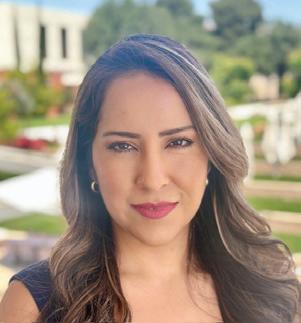
WCelebrating Our Legacy Investing in the Next Generation
hen Valeria Arias enrolled in the Systems, Families, and Couples PhD program at Loma Linda University’s School of Behavioral Health, she knew her calling was to help others find hope and healing. She didn’t know her own journey would deepen that calling in important ways.
While earning her degree, Valeria faced profound personal loss and unexpected challenges—all while raising four children. The support she received from LLU’s counseling services, her community, and her Seventh-day Adventist faith helped her find the strength she needed to continue her studies, care for her family, and hold fast to her purpose. Today, Valeria mentors fellow students and dreams of guiding future therapists to serve with the same compassion she experienced at Loma Linda University.
For decades, our School of Behavioral Health has shaped dedicated professionals like Valeria.
This year, we celebrated 30 years of our Clinical Psychology and Social Work programs, as well as 50 years of Counseling and Family Sciences. These milestones honor every graduate who carries forward our mission to provide a spiritually supportive context for teaching, clinical practice, and research innovation.

Make your gift today by visiting: lluh.org/giving/loma-linda-universityschool-behavioral-health or by scanning the QR code.
As we look to the future, we remain committed to opening doors for today’s students, equipping them to lead and strengthen the communities they will one day serve.
Will you join us in honoring our legacy and ensuring our students continue to thrive?
Through the Stronger Together Campaign, you can help expand student scholarships and academic opportunities that ease students’ burdens and keep them focused on what matters most: becoming the next generation of compassionate behavioral health leaders.
